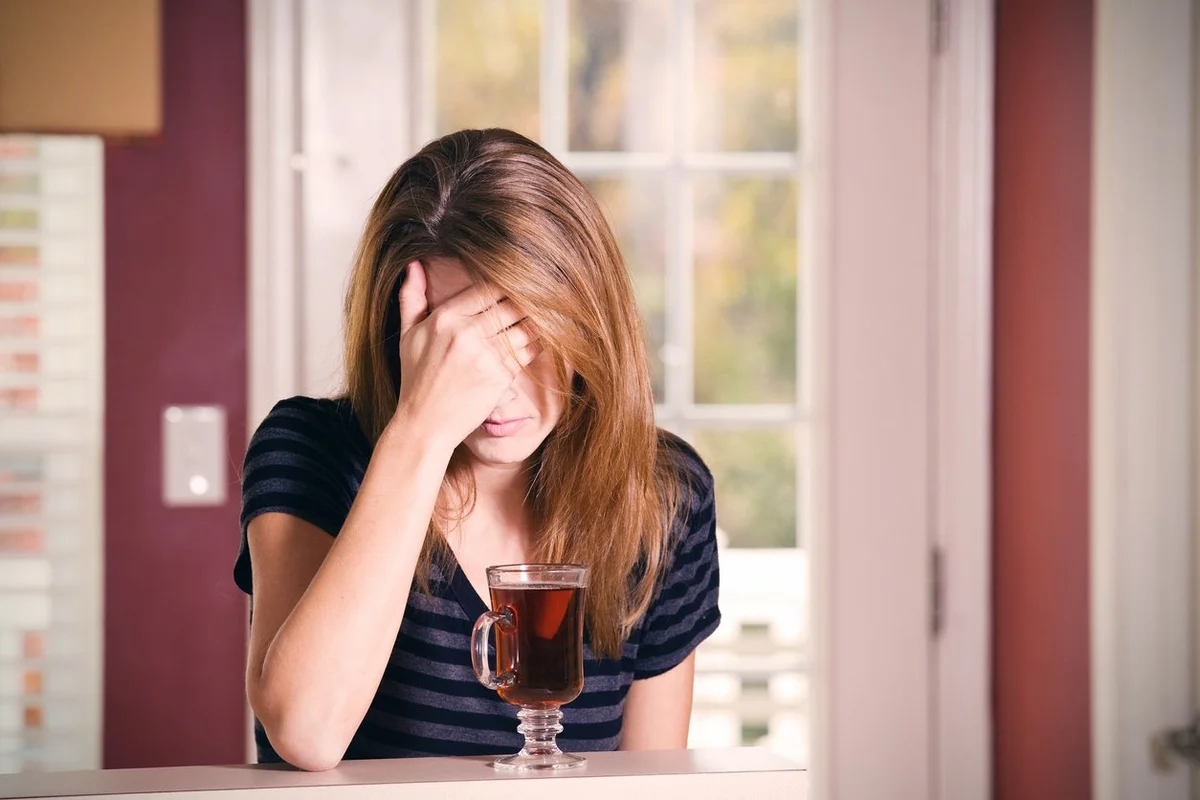At 5:30 am, my heart thumps loudly against my chest as my thoughts race. Although work doesn’t start for another two hours, my mind races ahead nonetheless.
My anxiety disorder makes this feeling familiar, but its sudden emergence was unexpected. Anxiety rarely arises at this hour – particularly not after going to bed late like last night!
Why am I feeling anxious right now? I search my brain for explanations. Did I have a bad dream, have I been dwelling too much on either my future or past without realizing it, am I dying, etc.
At times I find it hard to identify reasons for things, yet one particular piece of evidence stands out: Last night while out with friends I consumed alcohol. While not in excess, enough was consumed that my tipsiness became noticeable and I went home without taking steps to remove my mascara before bedtime.
Alcohol intake the night before has left me anxious, giving rise to “hangxiety”, or the state of nervousness, agitation and unease following an evening of drinking. Although there’s no clinical term for it yet, “hangxiety” serves as an accurate descriptor: nervousness, agitation and unease from drinking too much are common symptoms after too many drinks have been taken in one sitting.
Hangxiety symptoms are similar to regular anxiety symptoms: racing thoughts and an unsettling sense of unease.
“You may also feel unsteady, irritable and moody,” according to Jennifer Surak-Zammitti of New Jersey Psychotherapy Services.
Hangxiety can arise after too much alcohol has been consumed; this is simply how our minds work. Women may be more vulnerable than men to experiencing hangxiety due to less fluid in their bodies allowing more alcohol to remain in their bloodstreams and cause these feelings.
What Causes Hangxiety
Alcohol affects GABA levels in our brain, which acts as a relaxing chemical. A small amount of alcohol increases this GABA and results in relaxation; when we drink too much it depletes it resulting in panic-inducing feelings that could last up to 24 hours depending on how much was consumed.
Hangxiety affects approximately 12 people out of every 100, and Surak-Zammitti noted that anyone who drinks, depending on your brain sensitivity to alcohol, could potentially experience it to some degree; people living with mental illnesses such as anxiety may feel the effects more acutely.
“Substances can contribute to any mental illness, not only anxiety,” Surak-Zammitti noted. “Imagine having tight-netted door panels; when drinking alcohol loosens this screen and allows illnesses into our bodies more freely – thus worsening predisposed conditions such as anxiety.”
Alcohol Interrupts Sleep
Unfortunately, alcohol can disrupt our sleep, increasing anxiety levels.
Alcohol may help you sleep, but its effect on REM [rapid eye movement] means it won’t provide quality restful slumber, according to Surak-Zammitti. “You will wake up feeling unrested and fatigued.”
Sleep deprivation can also contribute to feelings of hangxiety.
How Can You Prevent Hangxiety
Apart from forgoing alcohol entirely, how can you prevent hangxiety?
Surak-Zammitti suggests becoming aware that drinking to become tipsy can contribute to hangxiety, in order to limit how much alcohol you drink and reduce hangxiety-causing hangxiety episodes. You should also try drinking less liquor than beer as liquor can make you more inebriated quickly than its beer equivalent.
“Think of it like playing chess,” she advised. “To gain the upper hand against your adversary.”
Your enemy in this instance is alcohol.
Anxiety from drinking too much alcohol is a natural consequence, but there are ways to minimize its effect and treat hangxiety as soon as it starts affecting you.
Surak-Zammitti suggests it can be useful to recognize that drinking contributed to your anxiety. Wondering why something makes you anxious often feeds it further; by recognizing this link between drinking and anxiety, and its presence, it helps break that cycle of questioning that feeds it further.
Gaining control of your thoughts is another effective strategy for alleviating hangxiety — and anxiety more generally.
“We need to work on our thoughts and create new mantras,” noted Laurel Steinberg, Ph.D., a psychotherapist. She noted that women tend to fall prey to perfectionist thinking which leads them down a path of further worry that could potentially aggravate anxiety levels further.
Steinberg suggests you can ease anxiety by telling yourself that drinking occasionally, in moderation and without becoming excessive can be part of a healthy lifestyle if it remains enjoyable. We can have agency over our experience without fearing it’ll spiral out of control.”
Keep a supply of remedies handy that can help ease tension.
“What helps you feel calm?” Surak-Zammitti inquired. “Maybe smelling lavender or lemon, taking a bath with various salts or even getting ready to take one are among your options; so make sure it happens soon!”
Avoid caffeine and stimulants like energy drinks; even though they may seem helpful at first. Stimulants tend to worsen anxiety.
Physical exercise is the best way to combat hangxiety.
Surak-Zammitti believes exercise can be the perfect cure for hangxiety; whether that means yoga classes or simply getting outside for a walk or run. “Beverages leave our bodies through pores,” so Surak-Zammitti recommends engaging in activities such as running to help flush alcohol from our system through our pores. Therefore, physical exercise such as running, yoga and/or cycling should be utilized as ways of fighting this ailment.
Assume that after an evening of heavy drinking, your system will begin to flush itself through sweating out. Do this to rid it from your system before getting drunk again.
